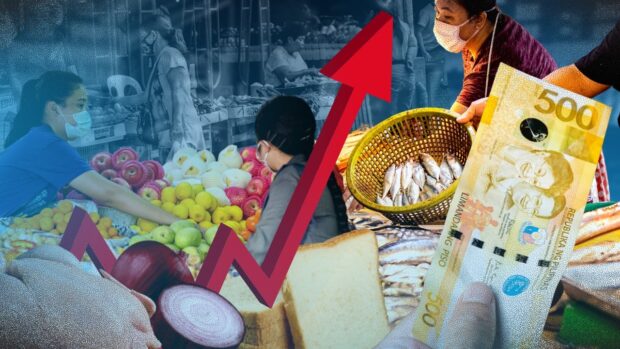Food prices seen to rise until 2024

COMPOSITE IMAGE BY JEROME CRISTOBAL FROM INQ FILE/STOCK PHOTOS
Agricultural economist Geny Lapina said food prices will remain steep this year and in 2024 due to the confluence of various events such as Russia’s invasion of Ukraine, which continues to impact the global market.
In an email to the Inquirer, Lapina said this was because both countries were major producers of wheat and maize as well as agriculture inputs such as fertilizers, which “drive up prices of food and raw materials from other sources.”
He cited other factors including the changing climate affecting agriculture output and food supplies, high fuel and input prices and export restrictions such as India’s export ban on rice.
“The main effects of these for the Philippines are mainly through higher food production and logistics costs (high input prices, high fuel costs) and of course through higher prices for imported raw materials [such as feeds] and food products [such as rice],” he said.
READ: PH inflation rose to 6.1% in Sept as food prices, transport cost soared
In Metro Manila alone, retail prices of rice, the country’s staple, climbed by almost P10 per kg as of this writing.
A kilo of regular milled rice produced locally retailed from P41 to P44 as of Friday, higher than the P38 per kilogram in the same period a year ago, based on the Department of Agriculture’s price monitoring. Local well-milled rice ranged from P45 to P48 per kg against the previous P40 per kg.
Imported regular milled rice is sold for P43 per kg, higher than P38 per kg last year while imported well-milled rice is priced from P45 to P48 per kg as opposed to P40.50 per kg.
Costlier pork, chicken
In the case of livestock and poultry products, prices of pork ham (kasim) hovered between P260 and P330 per kg from P300 per kg while pork liempo ranged between P290 and P400 per kg from P370 per kg.
Market vendors sold a kilo of whole chicken from P155 to P200 per kg, higher than last year’s P190 per kg while the price of egg (medium) reached P6.70 to P8.50 per piece from P7 per piece.
Fish prices have also increased. Milkfish (bangus) retailed from P160 to P240 per kg against P180 per kg previously. The price of tilapia rose to P110 to P160 per kg from only P120 per kg.
Retailers sold local round scad (galunggong) between P160 and P180 per kg and imported round scad from P220 to P260 per kg. Last year, local and imported round scad stood at P240 per kg and P200 per kg, respectively.
On Friday, President Marcos pressed Congress to pass a bill imposing heavier punishment for individuals who have committed agricultural economic sabotage.
In his speech during the distribution of smuggled rice to indigent families in Roxas City, Capiz, the President said the smuggling and hoarding of agricultural products have caused a spike in prices of prime commodities such as rice.
Economic sabotage
“That is why we are coordinating with Congress to amend some laws to make agricultural economic sabotage a crime and impose severe punishment,” he said.
Mr. Marcos earlier certified as urgent Senate Bill No. 2432, a measure that would define agricultural smuggling as a crime of economic sabotage, a nonbailable offense.
The bill seeks to repeal Republic Act No. 10845, or the Anti-Agricultural Smuggling Act of 2016.
On. Sept. 27, the House of Representatives passed on third and final reading its version of the bill while the Senate has yet to approve the measure.
In his speech in Roxas City, the President urged the public to help the government in its intensified crackdown against smugglers and hoarders.
The President also announced that about 10,000 rice farmers from Capiz would receive financial aid through the Rice Farmers Financial Assistance program this year.
Speaker Martin Romualdez, for his part, said at least 2.5 million poor Filipinos will be getting rice and financial assistance in the next two weeks amid higher prices of goods.